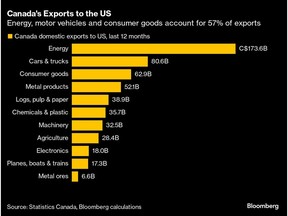Article content
(Bloomberg) — The Federal Reserve’s preferred inflation measure accelerated in October, helping explain US central bankers’ more cautious approach to interest-rate cuts.

The Federal Reserve’s preferred inflation measure accelerated in October, helping explain US central bankers’ more cautious approach to interest-rate cuts.

(Bloomberg) — The Federal Reserve’s preferred inflation measure accelerated in October, helping explain US central bankers’ more cautious approach to interest-rate cuts.
Article content
Article content
Top-line inflation in the euro area also picked up, though price growth excluding food and fuel held steady. European Central Bank officials have signaled a fourth reduction in rates at their final policy meeting of the year.
Advertisement 2
This advertisement has not loaded yet, but your article continues below.
THIS CONTENT IS RESERVED FOR SUBSCRIBERS ONLY
Subscribe now to read the latest news in your city and across Canada.
SUBSCRIBE TO UNLOCK MORE ARTICLES
Subscribe now to read the latest news in your city and across Canada.
REGISTER / SIGN IN TO UNLOCK MORE ARTICLES
Create an account or sign in to continue with your reading experience.
THIS ARTICLE IS FREE TO READ REGISTER TO UNLOCK.
Create an account or sign in to continue with your reading experience.
or
Article content
In India, the economy expanded at the slowest rate since the closing months of 2022, while a slump in industrial output helped drive the Turkish economy into a technical recession.
Here are some of the charts that appeared on Bloomberg this week on the latest developments in the global economy, markets and geopolitics:
US
The so-called core personal consumption expenditures price index, which strips out volatile food and energy items, increased 2.8% from October last year and 0.3% from a month earlier. The figures support recent comments by many Fed officials that there’s no rush to cut interest rates so long as the labor market remains healthy and the economy continues to power ahead.
President-elect Donald Trump vowed additional tariffs on Mexico, Canada and China, shaking markets with his first specific threats to the US’s top trading partners since his election win three weeks ago. Higher North American tariffs would upend the auto industry and other consumer sectors, including food, in which the three countries are highly integrated.
Europe
Euro-area inflation climbed above the ECB’s 2% target, though officials are unlikely to be deterred from continuing to lower interest rates next month and beyond.
Top Stories
Get the latest headlines, breaking news and columns.
By signing up you consent to receive the above newsletter from Postmedia Network Inc.
Thanks for signing up!
A welcome email is on its way. If you don’t see it, please check your junk folder.
The next issue of Top Stories will soon be in your inbox.
We encountered an issue signing you up. Please try again
Article content
Advertisement 3
This advertisement has not loaded yet, but your article continues below.
Article content
Light winds cut renewable generation in Germany, forcing it to import power from France, where nuclear output reached it’s highest level since January. France’s atomic plants are generating almost 50 gigawatts on Friday, about 20% higher than the average for the year.
Sweden has sent China a formal request for cooperation regarding a commercial Chinese vessel and its potential involvement with a breach of data cables in the Baltic Sea. The bulk carrier, Yi Peng 3, is anchored just outside of Denmark’s territorial waters. Vessels from Sweden, Denmark and Germany have been monitoring it. A high-speed fiber optic cable connecting Finland and Germany was cut over a week ago.
Asia
India’s economy grew at its slowest pace in almost two years, dampening the outlook for the full year and testing Prime Minister Narendra Modi’s ambitious growth plans.
Japanese companies are passing on rising labor costs to business customers in the form of higher service prices at the fastest pace in 32 years, according to Bank of Japan data that support the case for raising the benchmark interest rate.
Advertisement 4
This advertisement has not loaded yet, but your article continues below.
Article content
South Koreans’ outlook for the economy deteriorated at the fastest pace in more than two years in November, according to a monthly central bank survey conducted after Donald Trump’s US election victory.
Emerging Markets
Turkey entered a technical recession in the third quarter as industrial production plunged, providing more evidence to the central bank as it ponders whether to start cutting interest rates next month.
Brazil’s inflation picked up much more than expected in early November as the government readies cuts to public spending that is helping drive consumer price increases above target. Price pressures are building in Latin America’s largest economy, stoked by a historic drought and investor anxiety over growing government spending.
World
New Zealand lowered rates by a half percentage point, the Bank of Korea surprised with a rate cut, while the Central Bank of Nigeria opted for a smaller rate increase. Mozambique reduced its key rate to the lowest since 2020, Sri Lanka set its new single benchmark rate at 8% and Guatemala lowered. Kazakhstan raised rates for the first time since 2022, while Israel’s central bank left interest rates unchanged.
Advertisement 5
This advertisement has not loaded yet, but your article continues below.
Article content
As Trump prepares for a second term as US president, all eyes are on whether he will revive his so-called maximum pressure policy against Iran that came to mark his first spell. But with Iranians struggling with economic hardship after years of sanctions, its leaders are signaling they’re keen to establish a different relationship this time around. A hardline approach by Trump could significantly impact Iran’s oil trade.
—With assistance from Baris Balci, Nancy Cook, Eamon Akil Farhat, Toru Fujioka, Sam Kim, Golnar Motevalli, Brian Platt, Kati Pohjanpalo, Andrew Rosati, Zoe Schneeweiss, Mark Schroers, Grant Smith and Preeti Soni.
Article content
Share this article in your social network